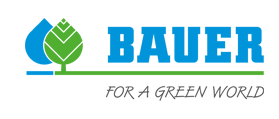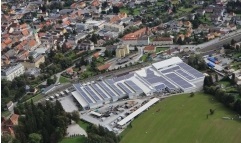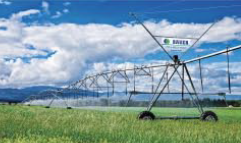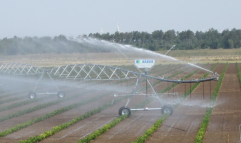Swan Hill farmer with first Bauer poly lined pivot
On the upper side of Swan Hill at Boundary Bend, Ken Westmore takes a long look over his 3,000 acres of mainly potatoes in their various stages. The sun is shining and there is the noise of a loader and the sweet smell of lucerne in a paddock nearby. Ken is testing out his purchase in a world-first of a “Polystar” poly lined centre pivot irrigator made by Bauer of Austria, which he bought from Swan Hill Irrigation, one of the most important Australian Bauer dealers.
Ken at 60, is an experienced farmer, well-respected in this Murray region once known as the place of the platypus. Nowadays, Ken focuses on his potatoes, a whole 7,000 tonnes he produces annually. His spuds are distributed in bulk with quality that is ready-made for the chip and crisp market, with keen buyers such as Smiths, Snack Brands, and Marvel frozen chips for outlets throughout Australia.
It appears he made a wise choice when he sold parcels of his land to an almond grower, creating an opportunity to buy more irrigation equipment which is the life blood of the irrigation sequence. Ken suggests he has ‘caught the potato disease and it’s now in his blood’.
The low undulating fields are perfect for potato growing but water has to be pumped from the Murray River ranging between 3km and 8 kilometres to the farthest point. This is where Ken Westmore’s experience and sound strategy kick in: pumping and irrigating potatoes with a voracious appetite for the clear liquid, a full sun, and requiring corrosive-resistant equipment.
The Westmores plant three or four varieties in February and August, dependent upon what works best for the buyers and their customers’ cooking needs. The soil has a slight sandy component which helps in the harvesting process because the particles drop more easily through the harvester’s shaking device, than does the heavier loam. During cultivation, the spuds are de-hilled, hilled and then sprayed, with hilling shovels to cover the mighty potato to prevent it from turning green.
The land is continually irrigated with four to five pivots operating at the one time. A pivot can operate without monitoring of the potatoes for half a day, or around the clock for two to three days for the lucerne crop. Signalling provides information about the pivot’s operating status but Bauer has an add-on telecommunication device that could turn the machine or pump on or off.
Looking across his farm it is easy to spot the centre pivot irrigators, sitting against the skyline ready for the next growing cycle. With large spans Ken finds it easier to leave the pivots insitu. He has nine Bauer centre pivot irrigators and is test-running his new “Polystar”, a low pressure system pivot, now corrosion resistant and employing an inner lining of polyethylene. Bauer has combined the extruded poly liner by inserting it into a standard hot-dipped galvanised span pipe. The sealing at the flange guarantees the integrity of the union between the two materials. These systems could also be used to irrigate wastewater in the sugar industry, or processing wastewater in the food industry, covering most fields of use, including aggressive media.
“I am happy to be the first to utilise this pivot, with its additional design of the stainless steel connector for the span pipe outlet - the more stainless, the better I like it, because that means there is no rust,” Ken said.
“We have a good local dealer in Swan Hill Irrigation - Ken and Leanne Lusty bend over backwards to help and they work in with me. The Bauer irrigator itself has a simple control panel, so there is no need to program the thing. It has a good switching arrangement and useful things like off-the-shelf circuit breaker and freely available parts.
“It gets me angry if I have to call for special parts for a non-Bauer,” says the innovative and indefatigable Ken, who is never short on ideas, and a real trendsetter in Victoria’s northwest. As a farmer for the past 40 years, potatoes are his passion but he also grows wheat, barley, corn, and lucerne, irrigated with the pivots during crop rotation. The new “Polystar” will obviate the need to replace rusted parts, an inhibitor of water flow. Ken has already designed his own time saving add-ons that only know-how can explain but he is adamant the poly liner should be used in all pivots. Bauer say they will continue their series of poly lined pivots, and according to the dealer and the Westmores, Bauer not only has 80 years of experience but they also listen at the grassroots, necessary in today’s competitive climate.
So, what is it like to try out the first “Polystar” in the world? “I started with pivots 25 years ago and Bauers since 2004 and I intend to put in more. With the dirty water from the Murray, these poly lined pipes offer an immediate solution to ensure a free flow of water to my plants. Growing 7,000 tonnes of spuds and other crops on top of that, you have to have an efficient means to irrigate continually as I do.”
Bauer also have a corner system which converts a circular irrigation surface into an almost square irrigation pattern, ensuring optimal irrigation of the area available. They retrofit these to existing pivot systems.
The Westmores harvest potatoes in December to February and from June till October, trucked to Melbourne, one load a day for three months. The potato harvesters clean 90 percent of the spuds, the rest are dry cleaned in the sheds. The farm is highly mechanised and a showcase for smooth operation. Ken barely gets time to himself, he says, and his wife Bev, and sons, Trevor and Colin are in it for the long run - even when dad is not around, they intend to keep the place going.
“I want to have a slack-attack and take a break when the time is right,” said Ken, as he runs around the paddock, putting right what went wrong. The Westmores have invested their lives in this enterprise, with initiative, endeavour, and research into new product, sticking to their knitting in potatoes and recycling with dependable crops.






